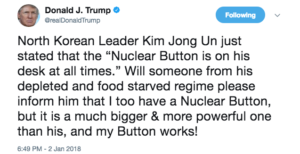Benjamin Kikkert – http://spotprenten.blogspot.com/

What do we see here?
“My button is bigger & more powerful than his” President Donald Trump tweeted on 2 January 2018 in response to a threat of escalation from North Korean dictator Kim Jong Un. Trump’s tweet does not address Kim Jong Un directly, but Trump’s own audience on Twitter. Of course the point is not literally to call on Twitter users to “inform” Kim of the US’s nuclear power, but the tweet does clearly activate its readers, Trump fans, as well as detractors and political commentators. It invites them to visualise and create the image Trump evokes through his words.
The cartoon above was made by Dutch newspaper cartoonist Benjamin Kikkert in January 2018. Although this is an excellent, simple yet evocative cartoon, one does not need to be a cartoonist to see more or less this mental image upon reading Trump’s tweet. The tweet’s language is simple and crude, but does call into being a grotesque image of two men vying for who has “the biggest button”. Right after Trump had tweeted this, varieties of the image that Kikkert has caught so well in his cartoon sprang up all over the internet, in amateurish as well as professional iterations. Some versions made the obvious connection – known also from memes about the size of Trump’s hands – to alpha males comparing their penises, but the simple version of the cartoon that literally translated Trump’s text into image, was prevalent.
Which public issue is being addressed here?
This is an example of the kind of humour that Trump used on Twitter to engage people – mainly his supporters, but also others – by inviting them to produce creative content. This dynamic fits into what is sometimes called prosumer culture, a media environment in which users are not just consuming media content, but also producing and spreading it. This mode of engagement is germane to social media communication. Because users can simply ‘like’ or ‘retweet’ something, but also actually make something (that is then shared and liked by others), specific bonds are created through the interaction.
What does the humour do?
This political communication logic (“engage users by employing outrage and entertainment, and getting them to make and share something funny in response”) is fundamentally different from the logic that political leaders have classically adopted (“explain political positions in the media to convince voters who is the best candidate”). This more recent cartoon logic also overhauls the old notion that being the object of cartoons is something the politician must passively bear. Trump is no doubt ridiculed in many cartoons and memes, but not just as an object. Through his tweets, he actively invited others to represent him in a cartoonish fashion, which bought him attention, engagement, and thus: political gain.
Indeed, this argument may be taken a step further: in a social world that exists largely online, the old, geographical notion of political constituency (a body of voters in a particular area), loses some of its function to the notion of online constituencies. These are political action or interest groups, mobilized by, for instance, a hashtag, a meme, or a particular style of memes. Creativity is welcomed, even in just small amounts (making memes is very easy, especially with meme generators). The results however, can make a political career.
Bibliography
Polak, S.A., Posting the Presidency: Cartoon Politics in a Social Media Landscape (Media Arts Law Review 22:4, 2018, 403-419), https://scholarlypublications.universiteitleiden.nl/handle/1887/68641
